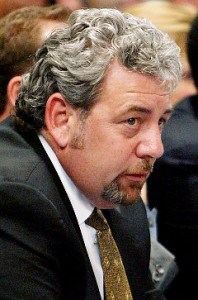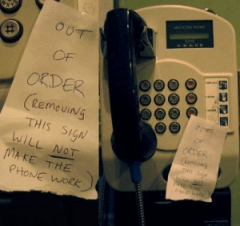
Press “1” to talk to James Dolan, CEO of Cablevision.
Cablevision has filed a lawsuit against the Communications Workers of America District 1 and its Local 1109, which represents area workers, in Nassau County Supreme Court.
The cable operator is accusing the union of launching harassing robocalls which have given customers the chance to pester CEO and president James Dolan.
At least 20,000 robocalls were made to Cablevision subscribers in three days, from Jan. 31 – Feb. 2 which the cable company alleges were designed to cost the company money and its reputation.
If customers pressed “1” during the call, they were automatically forwarded to a Cablevision call center to complain about recent rate increases and recent job losses at the company. On Feb. 3, Cablevision alleges the robocall campaign was adjusted. Now if customers press “1” during the call, they are directly connected to the phone sitting on Dolan’s desk. In just two days, Cablevision alleges Dolan’s line received 1,193 calls.
The following day, the union was also accused of sharing Dolan’s direct number on social media websites.
“The union will no doubt claim that their telephone harassment scheme is designed to allow customers to communicate substantive messages to the CEO, but such an argument cannot sustain the slightest scrutiny,” reads the complaint. “The unions knows full well that no Fortune 500 CEO can possibly handle a concentrated barrage of one-on-one phone calls with subscribers and others, and that companies like Cablevision have designated and publicly known call centers established precisely to handle such calls in an orderly, responsive manner – including mechanisms for escalating certain such calls to the CEO, if necessary.”
The CWA and Cablevision have fought over an effort to unionize cable company workers in Brooklyn, N.Y.
A year ago, Cablevision workers in Brooklyn voted to form a union, but Cablevision/Optimum management has allegedly stonewalled the unionization effort.
On Jan. 30, about two dozen workers sought to speak with Cablevision management under the company’s “open door” policy, specifically about the lack of progress in completing a contract. Cablevision terminated the 22 employees on the spot, deeming them “permanently replaced.”
Cablevision’s suit requests court costs and an injunction ordering the union not to harass it, aid or abet harassment, or falsely and deceptively display any Cablevision phone number on robocalls.
[flv width=”640″ height=”380″]http://www.phillipdampier.com/video/CWA Fired Cablevision Workers 2-2013.flv[/flv]
The Communications Workers of America produced this video highlighting what they consider the unfair termination of 22 workers after seeking an “open door” meeting with Cablevision management. (2 minutes)


 Subscribe
Subscribe Nearly four months after Hurricane Sandy struck Manhattan, many customers are still waiting to get their phone and Internet service restored.
Nearly four months after Hurricane Sandy struck Manhattan, many customers are still waiting to get their phone and Internet service restored. That was an improvement over how the company performed in October and December, 2011, where prolonged service outages provoked the PSC to eventually fine Verizon $400,000.
That was an improvement over how the company performed in October and December, 2011, where prolonged service outages provoked the PSC to eventually fine Verizon $400,000. The Bloomberg Administration strongly disagrees with the PSC’s handling of outage information.
The Bloomberg Administration strongly disagrees with the PSC’s handling of outage information. A handful of broadcasters in California, Michigan, Montana and New Mexico interrupted their regularly scheduled programs earlier this week to warn audiences that zombie attacks were underway and residents should avoid the undead at all costs.
A handful of broadcasters in California, Michigan, Montana and New Mexico interrupted their regularly scheduled programs earlier this week to warn audiences that zombie attacks were underway and residents should avoid the undead at all costs.
 Under Malone’s leadership, TCI Cable raised rates 60 percent in 1992 alone, helping drive the enactment of the 1992 Cable Act which began to slow the pace of rate hikes. The bill was vetoed by then President George H.W. Bush but overridden in Congress after tens of thousands of constituent complaints poured into Washington. It was sweet justice for many elected officials who were on the receiving end of Malone’s hardball tactics for nearly 20 years. Malone was well known for retaliating against local officials who opposed his unfettered rate increases by suddenly cutting off service to customers and putting up on-screen messages in the place of favorite channels with the names and phone numbers of elected officials Malone claimed were responsible.
Under Malone’s leadership, TCI Cable raised rates 60 percent in 1992 alone, helping drive the enactment of the 1992 Cable Act which began to slow the pace of rate hikes. The bill was vetoed by then President George H.W. Bush but overridden in Congress after tens of thousands of constituent complaints poured into Washington. It was sweet justice for many elected officials who were on the receiving end of Malone’s hardball tactics for nearly 20 years. Malone was well known for retaliating against local officials who opposed his unfettered rate increases by suddenly cutting off service to customers and putting up on-screen messages in the place of favorite channels with the names and phone numbers of elected officials Malone claimed were responsible.
